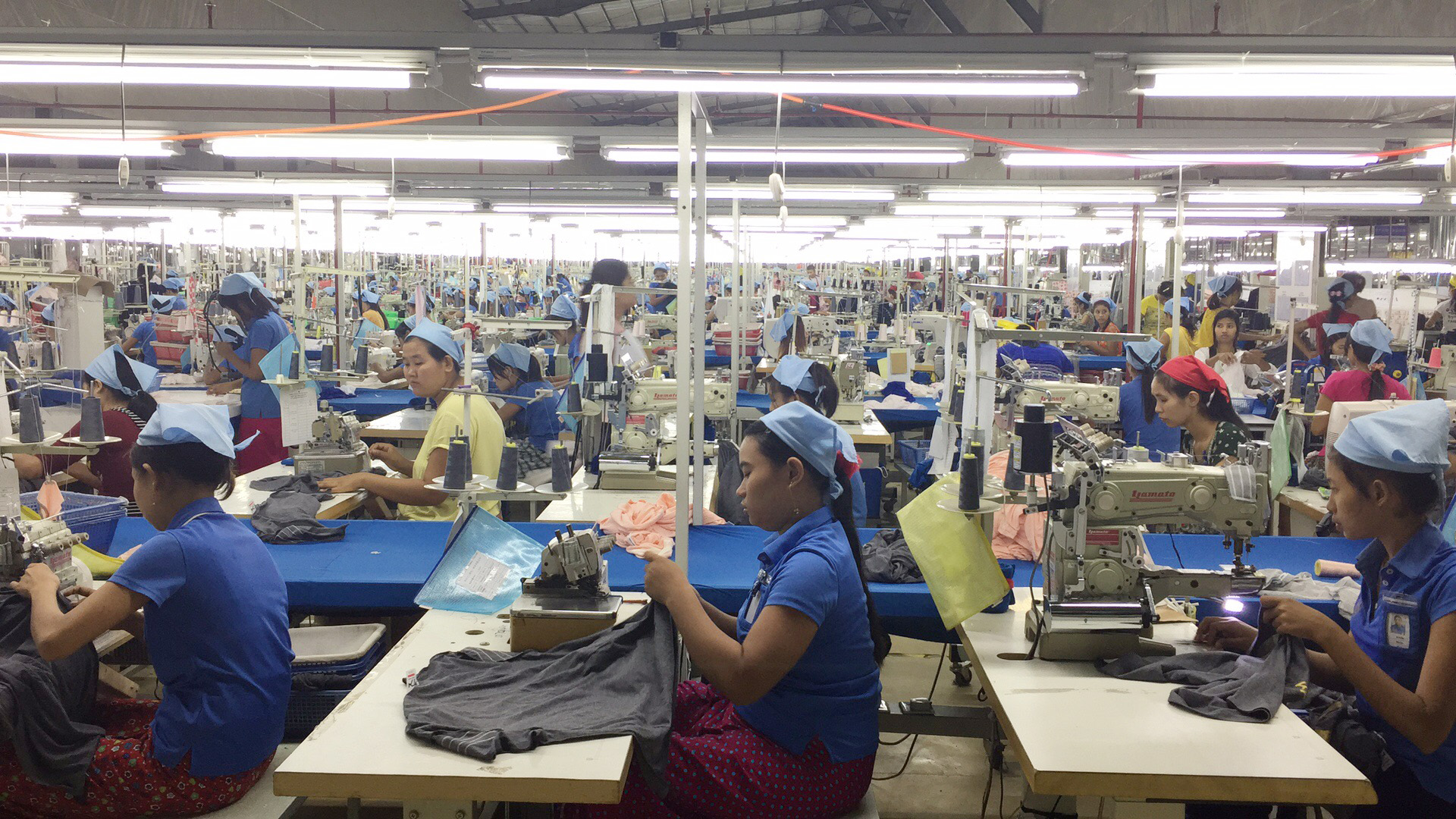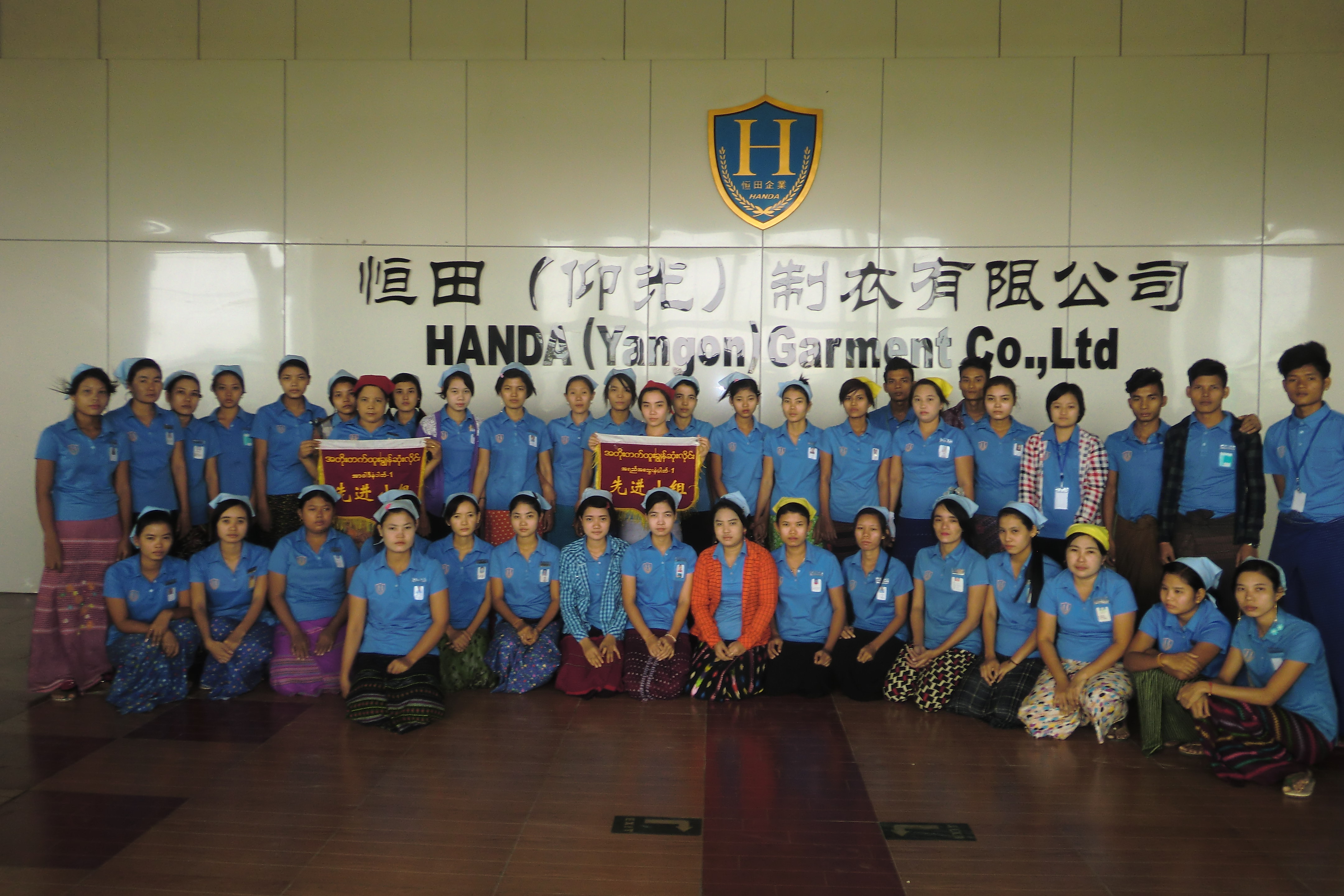Handa Enterprise (Myanmar) actively improves the company's supply chain management program, enhancesthe supply chain management capabilities, and strengthensthe competitiveness.
At the same time, we are actively investing a vertically integrated supply chain in Yangon, Myanmar. Once we open the knitting and dyeing factory and develop local suppliers of accessories in Yangon, we can realize the local procurement of most raw materials. It further deepens the business cooperation with local market, and promotes the economic development of Myanmar.
Supplier Management
Handa Enterprise (Myanmar) Co.,Ltd.has always focused on cooperative relationship with suppliers. During the process of choosing and auditing suppliers, we focus on the suppliers’ overall qualities and their corporate social responsibilities. HandaEnterprise(Myanmar)Co.,Ltd.brings supplier's social responsibility into Supplier Management, making sure suppliers understand BSCI standards and follow accordingly. By dong so, we will also help to improve suppliers’ management and look for a long-term cooperation relationship.
The company manages suppliers by the procurement department. Procurement department conducts audits based on the supplier's social performance status or documentation, only companies that are judged as conditionally acceptable by the on-site audit can become qualified suppliers.
Procurement Department establishes social-responsibility files for suppliers and subcontractors and maintains evidence and records of suppliers’ and subcontractors’ assessment results and improvement measures. All suppliers and subcontractors should sign a social responsibility letter before getting an order or contract, promising to comply with local labor laws and social responsibility standards, and are willing to accept the company's on-site audit.
In terms of supplier selection,Handa Enterprise (Myanmar) Co.,Ltd.conducts quality assessment, social responsibility assessment and second-party audit on the suppliers and subcontractors. Qualified suppliers would be reasonably regulated. The supply chain department would arrange an on-site audit at least once a year, to assess the social responsibility performance and action plan improvement of suppliers and subcontractors with records. Once the supplier or subcontractor are found to use child laborers, prisoners, forced labors, or violate BSCI standardsduring on-site audits, all Handa Enterprise’s departments would be informed to stop partnership with such supplier or subcontractor.
The company regularly looks into the business relationship between subcontractors and their sub-suppliers, to prevent its sub-suppliers from seriously violating standards, such as the using child laborers, prisoners, forced laborers, and discrimination. The new subcontractor must accept the on-site audit before accepting the order. Only if the on-site audit result is accepted or conditionally accepted, can our company establish a business relationship with the subcontractor.
Suppliers who refuse on-site audits will not be considered. For suppliers that have obtained certifications such as BSCI, and are evaluated and accepted by internationally recognized customers, the company is free to check its social responsibility status. However, relevant certificates or assessment reports must be collected. If there are no bad records for on-site audits for three consecutive years, the audit cycle may be extended appropriately.
For finished goods’ storage and delivery which are from suppliers and subcontractors, the product's product name, category, quality and quantity must be strictly controlled, and the merchandiser must make sure that the country of origin records are correct. When there are errors in product quality, quantity, and identification, coordinate with suppliers and subcontractors to solve problems immediately.
Quality Management
Product quality and safety are the foundation for the company's survival and development. For that reason, we have established a complete quality management system. From the procurement of raw materials to the delivery of finished products, every activity is strictly controlled with high access standards.Materials that do not meet quality and safety standards will never be stored, unqualified products will never be sent.
In order to unify the company's internal quality standards, and to standardize them, combined with the actual situation of the company the ‘Quality Manual’ was formulated and promulgated. The manual identifies the company's quality management system, clarifies quality policies and goals, helps the company keep abreast of the operation of the quality management system for management review and as a basis for quality management system improvement.It is the company's quality management guidelines and regulatory documents, and also proof to win trust from customers and certification organizations.

Parts of quality manual
Quality policies
No flaws accepted
No defects produced
No blemishes allowed
Quality goals
Thread ends rate ≤8%
Unqualified products rate≤ 10%
Contract shipping rate≥ 98.50%
Customer satisfaction rate≥ 90 points
Procurement process and supplier control
Investigate supplier’s capabilities before the purchase, which includes: 1.Planning Supply Department is responsible for fabric suppliers and the Outsourcing Department is responsible for accessories suppliers and outsourcers for conducting quality assurance ability survey. 2.Content of quality assurance ability survey: enterprise profile, supply variety, quality level, inspection level, etc. Supplier Status Questionnaires would be distributed and filled.
Qualified suppliers' assessment and selection: 1.Planning Supply Department, Outsourcing Department, Productive Department should organize relevant departments to assess supplier's ability and performance to identify qualified suppliers, the list must be submitted to the president or managing representative for approval and confirmation. 2. Planning Supply Department, Outsourcing Department, productive Department should establish and save qualified suppliers’ supply performance records.Quantity, quality, delivery date, etc. must be noted as the reference for continuation or cancellation of the cooperation. If the quality of continuous two supplies is inconsistent and has not been improved, the supplier shall be disqualified. (According to the warehouse records and quality inspection records, etc.)
Verification of purchased products: 1.When our company requires the purchased product to be verified at the supply source of the supplier, the method of inspection and the way to release the purchased products should be specified in the purchase requirements. 2.It would be arranged if the customer requests the verification of the supplier's products at our company and the supply source, however, customer’s verification request cannot be used as a basis for effective control of supplier quality. 3. Customer's verification does not relieve the company of the responsibility to provide acceptable products, nor would exclude the possibility of rejection after the verification. 4.Verification of the purchased products should be performed in accordance with the relevant requirements of the ‘Product Surveillance and Measurement Control Procedures’. 5.For necessary outsourcing processing, Productive Department is responsible for executing the above-related regulations.
To ensure that the products delivered meet customers’ requirements to the greatest extent possible and comply with laws and regulations, the company strictly controls the production, release, and delivery of products. In the production process, the company keeps strict process management, the workshop is responsible for the technical handover with technical support personnel from the Technical Department according to the Production Notice. The workshop team leader combines the technical documentation provided by the Technical Department with the actual situation of the team and arrange the production process.The first product from the first package would be sent to the Technical Department for checking and sealing, the mass production would not start before it’s qualified. Any deviation from the process requirements must be corrected immediately once it’s discovered. The workshop must strictly implement the requirements in the production process, and stick to the process list. The process change must be modified and signed by the Technical Department personnel on the original process list if necessary, then related departments may perform the changed process requirements. The quality inspection personnel (workshop manager) conducts inspections on the implementation of the technical documentation provisions of each team, records the situation and immediately corrects the problems if there is any. Inspectors of the team should inspect all semi-finished products and finished products one by one. Unqualified products must be clearly marked and immediately returned to the original process for reworking, related records should also be made accordingly.
During 2019 quality control staffs regularly convene the analysis and develop it as a routine job. There would be workshop team quality assessment and praise every month. A consensus and atmosphere of quality first and common management are formed both in the company and the factory. All make sure that product quality and safety are above the standard line, and would continue to improve.

Before issuing this report,the company did not receive product returns and consumer complaints for product safety issues.